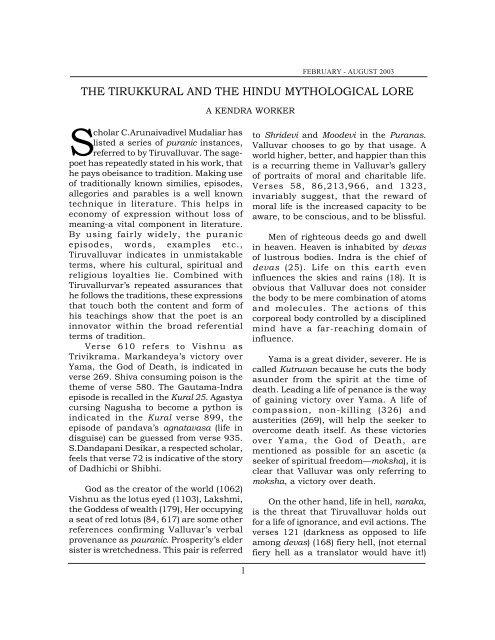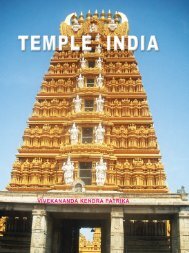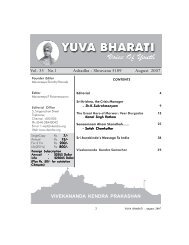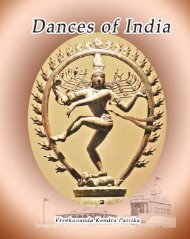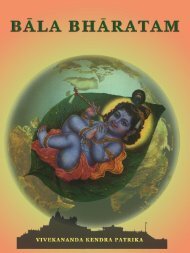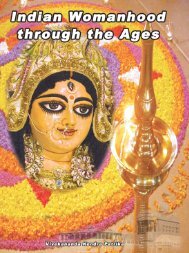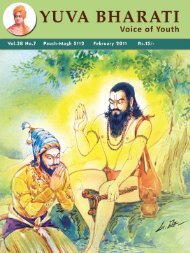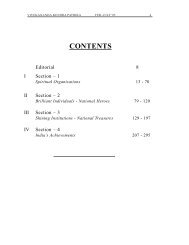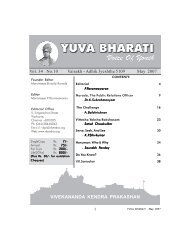Epics in Imprints-1.pdf - Vivekananda Kendra Prakashan
Epics in Imprints-1.pdf - Vivekananda Kendra Prakashan
Epics in Imprints-1.pdf - Vivekananda Kendra Prakashan
You also want an ePaper? Increase the reach of your titles
YUMPU automatically turns print PDFs into web optimized ePapers that Google loves.
1<br />
FEBRUARY - AUGUST 2003<br />
THE TIRUKKURAL AND THE HINDU MYTHOLOGICAL LORE<br />
Scholar C.Arunaivadivel Mudaliar has<br />
listed a series of puranic <strong>in</strong>stances,<br />
referred to by Tiruvalluvar. The sagepoet<br />
has repeatedly stated <strong>in</strong> his work, that<br />
he pays obeisance to tradition. Mak<strong>in</strong>g use<br />
of traditionally known similies, episodes,<br />
allegories and parables is a well known<br />
technique <strong>in</strong> literature. This helps <strong>in</strong><br />
economy of expression without loss of<br />
mean<strong>in</strong>g-a vital component <strong>in</strong> literature.<br />
By us<strong>in</strong>g fairly widely, the puranic<br />
episodes, words, examples etc.,<br />
Tiruvalluvar <strong>in</strong>dicates <strong>in</strong> unmistakable<br />
terms, where his cultural, spiritual and<br />
religious loyalties lie. Comb<strong>in</strong>ed with<br />
Tiruvallurvar’s repeated assurances that<br />
he follows the traditions, these expressions<br />
that touch both the content and form of<br />
his teach<strong>in</strong>gs show that the poet is an<br />
<strong>in</strong>novator with<strong>in</strong> the broad referential<br />
terms of tradition.<br />
Verse 610 refers to Vishnu as<br />
Trivikrama. Markandeya’s victory over<br />
Yama, the God of Death, is <strong>in</strong>dicated <strong>in</strong><br />
verse 269. Shiva consum<strong>in</strong>g poison is the<br />
theme of verse 580. The Gautama-Indra<br />
episode is recalled <strong>in</strong> the Kural 25. Agastya<br />
curs<strong>in</strong>g Nagusha to become a python is<br />
<strong>in</strong>dicated <strong>in</strong> the Kural verse 899, the<br />
episode of pandava’s agnatavasa (life <strong>in</strong><br />
disguise) can be guessed from verse 935.<br />
S.Dandapani Desikar, a respected scholar,<br />
feels that verse 72 is <strong>in</strong>dicative of the story<br />
of Dadhichi or Shibhi.<br />
God as the creator of the world (1062)<br />
Vishnu as the lotus eyed (1103), Lakshmi,<br />
the Goddess of wealth (179), Her occupy<strong>in</strong>g<br />
a seat of red lotus (84, 617) are some other<br />
references confirm<strong>in</strong>g Valluvar’s verbal<br />
provenance as pauranic. Prosperity’s elder<br />
sister is wretchedness. This pair is referred<br />
A KENDRA WORKER<br />
to Shridevi and Moodevi <strong>in</strong> the Puranas.<br />
Valluvar chooses to go by that usage. A<br />
world higher, better, and happier than this<br />
is a recurr<strong>in</strong>g theme <strong>in</strong> Valluvar’s gallery<br />
of portraits of moral and charitable life.<br />
Verses 58, 86,213,966, and 1323,<br />
<strong>in</strong>variably suggest, that the reward of<br />
moral life is the <strong>in</strong>creased capacity to be<br />
aware, to be conscious, and to be blissful.<br />
Men of righteous deeds go and dwell<br />
<strong>in</strong> heaven. Heaven is <strong>in</strong>habited by devas<br />
of lustrous bodies. Indra is the chief of<br />
devas (25). Life on this earth even<br />
<strong>in</strong>fluences the skies and ra<strong>in</strong>s (18). It is<br />
obvious that Valluvar does not consider<br />
the body to be mere comb<strong>in</strong>ation of atoms<br />
and molecules. The actions of this<br />
corporeal body controlled by a discipl<strong>in</strong>ed<br />
m<strong>in</strong>d have a far-reach<strong>in</strong>g doma<strong>in</strong> of<br />
<strong>in</strong>fluence.<br />
Yama is a great divider, severer. He is<br />
called Kutruvan because he cuts the body<br />
asunder from the spirit at the time of<br />
death. Lead<strong>in</strong>g a life of penance is the way<br />
of ga<strong>in</strong><strong>in</strong>g victory over Yama. A life of<br />
compassion, non-kill<strong>in</strong>g (326) and<br />
austerities (269), will help the seeker to<br />
overcome death itself. As these victories<br />
over Yama, the God of Death, are<br />
mentioned as possible for an ascetic (a<br />
seeker of spiritual freedom—moksha), it is<br />
clear that Valluvar was only referr<strong>in</strong>g to<br />
moksha, a victory over death.<br />
On the other hand, life <strong>in</strong> hell, naraka,<br />
is the threat that Tiruvalluvar holds out<br />
for a life of ignorance, and evil actions. The<br />
verses 121 (darkness as opposed to life<br />
among devas) (168) fiery hell, (not eternal<br />
fiery hell as a translator would have it!)


